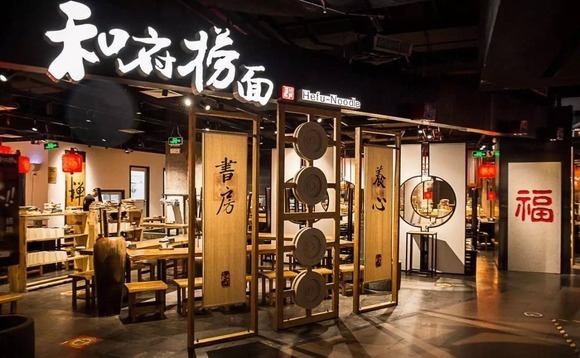
Deal focus: Hefu does dining at scale

China restaurant chain Hefu Noodle caters to a lunchtime office-worker client base from a network of central kitchens. Meridian Capital is one of several investors sold on the expansion opportunity
Conveniently located in the commercial hubs of Chinese cities, restaurant chain Hefu Noodle quickly became a weekday lunchtime favorite of Weiwei Wang, a managing partner at Meridian Capital.
The outlets were notable for their elegant design – they are decorated like ancient Chinese study rooms with an aesthetic inspired by Zen Buddhism – and cleanliness. But there was more. Hefu relied on central kitchens, suggesting that further expansion could be swift and cost-effective.
"Investment is about scalability. Hefu provides highly standardized products that are easy to scale up," says Wang. "This is a huge market, and the pace of growth exhibited by the leading players actually exceeds that of the wider industry."
Meridian joined a RMB450 million ($68 million) Series D round for the company last year, which was led by Tencent Holdings and Longfor Capital. Last week, Hefu closed a RMB800 million Series E led CMC Capital. ZWC Partners joined as a new investor, while Tencent, and Longfor re-upped.
Wang met Hefu's management team for the first time in February 2020, as COVID-19 was gathering pace in China. The investment closed eight months later, by which point it was apparent that the pandemic could become a significant consolidation opportunity.
"A lot of mom-and pop-shops died during the pandemic due to poor liquidity, while large players that made it through have been able to expand. Widespread closure of smaller restaurants left a lot of properties empty and the likes of shopping malls are offering attractive rental packages. This means the penetration of chain operators has accelerated," says Wang.
Hefu was among the first catering brands in China to recover from COVID-19, with single-store sales returned to pre-pandemic levels in the second half of 2020.
As of June, the company had more than 340 outlets nationwide. The goal is to reach 450 this year, doubling the pace of expansion seen in 2020, with a new store opening about once every two days. While the average customer spend is RMB45 per head, average monthly turnover per store is RMB55,000. Hefu has posted annual revenue growth of 50% for "several continuous years."
Wang attributes this growth to several factors. First, Hefu has strong supply chain capabilities. Prior to opening its first store, the company established a network of central kitchens and cold chain infrastructure capable of supporting 1,000 outlets. It also implemented digital systems to connect front, middle, and back-end functions.
All dishes are pre-cooked and delivered to outlets. For example, fried rice is cooked, divided into individual portions, and placed in sealed packages. Every morning, Hefu's logistics team makes shipments from warehouses to restaurants, where the fried rice portions are held in storage on-site. Once a customer places an order, the dish is heated up and fresh green onion is sprinkled on top.
Second, Hefu's lunchtime crowd from nearby offices represents a consistent source of demand. In this sense, Wang believes the company differs from other central kitchen concepts, such as hotpot chain Haidilao. "Dining in groups is the lifeblood of Haidilao," he explains. "Hefu is a fast-track option for white-collar office workers. Haidilao has higher unit prices, but Hefu has a high repurchase rate."
The company is using its financial backing to replicate its central kitchen model in other catering scenarios. In April, Heu launched Xiao Mian Xiao Jiu, which means "little noodles with a little wine." Marketed under the slogan, "Who is the one you want to drink with?" and featuring a longer menu, the brand is aimed at young urban consumers. There will be 50 outlets by year-end.
Hefu has also entered the retail space, rolling out 20 direct-to-consumer products available via e-commerce platforms.
Latest News
Asian GPs slow implementation of ESG policies - survey
Asia-based private equity firms are assigning more dedicated resources to environment, social, and governance (ESG) programmes, but policy changes have slowed in the past 12 months, in part due to concerns raised internally and by LPs, according to a...
Singapore fintech start-up LXA gets $10m seed round
New Enterprise Associates (NEA) has led a USD 10m seed round for Singapore’s LXA, a financial technology start-up launched by a former Asia senior executive at The Blackstone Group.
India's InCred announces $60m round, claims unicorn status
Indian non-bank lender InCred Financial Services said it has received INR 5bn (USD 60m) at a valuation of at least USD 1bn from unnamed investors including “a global private equity fund.”
Insight leads $50m round for Australia's Roller
Insight Partners has led a USD 50m round for Australia’s Roller, a venue management software provider specializing in family fun parks.








